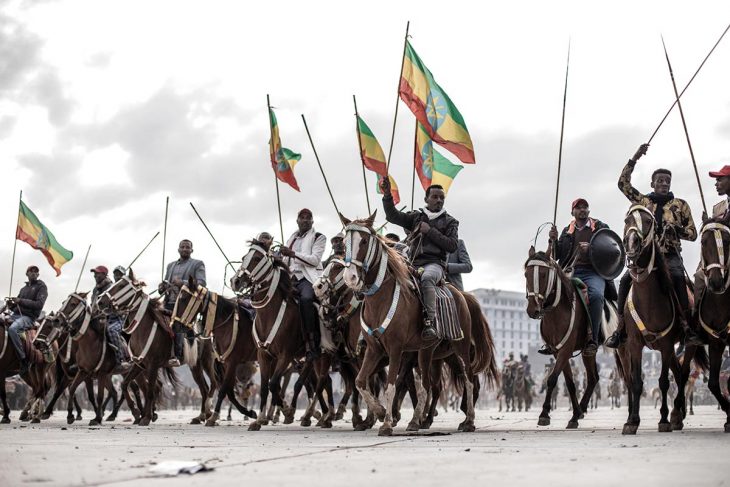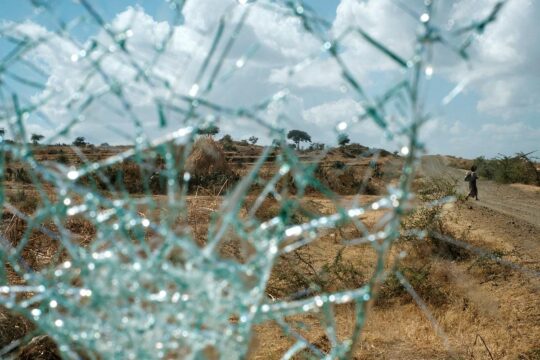The UN report on Northern Ethiopia’s Tigray region is based on a joint investigation of the UN High Commissioner for Human Rights and the Ethiopian Human Rights Commission (EHRC) and was released on November 3. It documents a pattern of serious violations and abuses, “including unlawful killings and extra-judicial executions, torture, sexual and gender-based violence, violations against refugees, and forced displacement of civilians”, as well as widespread arbitrary detentions and enforced disappearances.
The report covers the period from November 3, 2020, when the armed conflict began, and June 28, 2021 when the Ethiopian government declared a unilateral ceasefire. This has subsequently gone up in smoke with a new alliance of the Tigray People’s Liberation Front (TPLF) and other rebel groups threatening to take the capital Addis Ababa and topple the government of Prime Minister Abiy Ahmed, who is ironically the 2019 Nobel Peace Prize winner.
On November 2, Ahmed’s government declared a national state of emergency and called for civilians to take up arms to defend the capital, as Tigrayan forces advanced towards Addis Ababa.
Warnings of genocide
Some NGOs and analysts are also pointing to risks of genocide against ethnic Tigrayans. Norwegian expert on the Horn of Africa Kjetil Tronvoll sees worrying parallels with the 1994 genocide in Rwanda with “ethnic profiling of Tigrayans who are being rounded up and language that calls them a cancer and weeds to be rooted out”. In an interview with Justice Info, he slammed the UN human rights office for working alongside the state-appointed EHRC and watering down its report. While the TPLF and their allies have also committed serious crimes, he says the majority are being committed by the Ethiopian government. He said that the majority of sexual violence and massacres in Tigray were being carried out by the government’s ally, the neighbouring Eritrean armed forces of long-term dictator Isaias Afwerki. In an article in The Conversation, regional expert Marine Gassier adds that the report "does not account for the airstrikes that hit Tigray, nor for the famine resulting from the government's decision to prevent the delivery of humanitarian aid to the region. By using starvation as a means of combat, the government is committing what the International Criminal Court and Ethiopian law consider a war crime," she said.
In a statement on November 8, UN Special Adviser on Prevention of Genocide Alice Wairimu Nderitu of Kenya expressed grave concern about the situation in Ethiopia, including “increased incidence of ethnically and religiously motivated hate speech”, saying there were “serious indicators of risk of commission of atrocity crimes”. But she did not name names.
Facebook, long accused of failing to stop its platforms being used for incitement including in Myanmar, earlier this month took down a post by Prime Minister Ahmed urging citizens to "organise and march through [any] legal manner with every weapon and power... to prevent, reverse and bury” Tigrayan forces. A recent report in the respected French newspaper Le Monde quoted a “good source who monitors different platforms including Facebook and Twitter” saying that online content has recently taken on “an unprecedented tone of violence”. That report also cites witness accounts of people suspected of Tigrayan ethnicity being arbitrarily arrested at roadblocks and quotes at least one direct call for extermination.
On November 16, the UN reported that “at least 1,000 individuals are believed to have been detained over the past week or so – with some reports putting the figure much higher”. “These developments are all the more disturbing given that most of those detained are reported to be people of Tigrayan origin, arrested often on suspicion of being affiliated to or supporting the Tigray People’s Liberation Front,” it said. For William Davison, senior Ethiopia analyst at the International Crisis Group (ICG), “the prospect of that state crackdown on Tigrayans under the state of emergency as the war gets closer to Addis, combined with the increased likelihood of more mob violence and anti-Tigrayan hate speech, creates an incredibly worrying situation now and in terms of what may be to come, on top of what we saw during the intervention in Tigray.”
There were also reports on that same day that some 200 young children had died of starvation in hospitals in Tigray, where the Ethiopian government has imposed a de facto blockade on humanitarian aid, including food and medicine.
Poor hopes for national justice
The UN report calls for accountability for crimes against civilians committed in this war. It highlights the “many calls made by victims and survivors for perpetrators to be brought to justice”, saying they “conveyed powerful demands for the restoration of their livelihoods and reparations for what they had lost, and for the truth of what happened to their loved ones to be established”.
The report stresses that the prime responsibility lies with the government of Ethiopia to investigate and punish serious crimes, as confirmed by Daniel Bekele, chief commissioner of the EHRC, in an interview with Justice Info. “We are aware that efforts are already underway including the prosecution of some perpetrators already being convicted,” he explains. “The Ethiopian judiciary has also since recently demonstrated independent handling of cases. Therefore, there is an opportunity for accountability through the national justice system which is always the most preferred justice mechanism,” he claims.
However the UN report said that “investigations conducted by Ethiopian national institutions do not match the scope and breadth of the violations (…) nor that those investigations which are being undertaken sufficiently comply with international standards”. It also expressed concern that “the national institutions may not be sufficiently addressing issues of command responsibility for the violations they are investigating”.
Tronvoll says that while there have indeed been some prosecutions and there may be some individuals in the Ethiopian justice system who are independent, the Attorney General and the judicial system in general are not, because “the chain of command goes up to the Prime Minister”.
The report’s call on the government of neighbouring Eritrea – which has one of the worst human rights records in the world and is hardly known for accountability – to investigate and prosecute serious crimes by its nationals in Tigray provokes an ironic laugh from Tronvoll.
Should the Nobel Committee be held accountable?
The UN report looks at possible international accountability mechanisms. Neither Ethiopia nor Eritrea are members of the International Criminal Court, so the ICC could only investigate and prosecute on a mandate from the UN Security Council. This is unlikely given the veto powers particularly of China and Russia.
The report refers to the possibility of creating “an international, independent investigative mechanism” charged with collecting criminal evidence and preparing files for future prosecutions, like was done for Syria, Iraq and Myanmar. Bekele does not seem to see it as the most desirable option. “We should give priority for the national justice mechanism to work,” he told Justice Info. But ICG’s analyst Davison backs the idea. “Given Ethiopia’s political conditions, instability and weak institutional capacity in this regard, I think that type of independent international fact-finding into exactly what has gone on is absolutely necessary,” he told Justice Info.
Tronvoll, who is also director of private consultancy firm Osloanalytica, recently argued in British newspaper The Guardian that the Nobel committee should resign over the atrocities in Tigray, given that its rules do not allow withdrawal of Ahmed’s peace prize. The prize was awarded to Ahmed in particular for his peace deal with Eritrea and political reforms. But Tronvoll told Justice Info it was already clear before the peace prize was announced that domestic reforms were backsliding and that “the Ethiopia-Eritrea rapprochement had more political objectives than objectives of peace”. Tronvoll thinks the Nobel prize actually helped fuel the conflict in Tigray. “We know that Abiy Ahmed used the prize to enforce his policies back home, particularly of dismantling the old government party and establishing the Prosperity Party [see box below]. He did that just three or four days after he came back from Oslo, and he claimed – and I know that from insiders -- ‘I have been given an international recognition to do as I like’,” says Tronvoll.
BRIEF BACKGROUND TO THE TIGRAY CONFLICT
Ethiopia has dozens of different ethnic groups. The largest is the Oromo (35%), of which President Abiy Ahmed is a member, followed by the Amhara (27%), then Tigrayans and ethnic Somalis which both make up around 6%. Smaller groups make up the rest.
1991 > A coalition of rebel groups led by the Tigrayan People’s Liberation Front (TPFL) and supported by forces from Eritrea (then part of Ethiopia and fighting for separatism) overthrows the brutal Marxist regime of Mengistu, who goes into exile in Zimbabwe. TPLF leader Meles Zenawi becomes Prime Minister and subsequently President, leading an authoritarian Ethiopian People’s Revolutionary Democratic Front (EPRDF) government until his death in 2012.
1993 > Eritrea gains independence from Ethiopia. Isaias Afwerki becomes president and remains so to this day.
1999-2000 > Ethiopia-Eritrea border war. The war ends, but a border dispute lingers on.
2018 > EPRDF Abiy Ahmed becomes the country’s first ethnic Oromo Prime Minister and launches a reform programme. He puts an end to the state of war with Eritrea.
2019 > Ahmed wins Nobel Peace Prize. He forms a new party, the Prosperity Party from three of the four partners in the EPRDF. The TPLF refuses to join.
June 2020 > Ahmed government postpones elections due to Covid-19.
September 2020 > Tigray holds regional elections in defiance of the central government.
November 2020 > Ahmed orders a military offensive against regional forces in Tigray. He said he did so in response to an attack on a military base housing government troops. It is the beginning of the Tigray war.
For more information, visit the Crisis Group website, which specialises in the Horn of Africa region.







